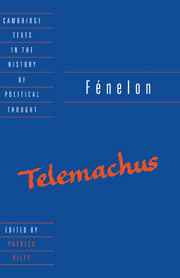
-
Select format
-
- Publisher:
- Cambridge University Press
- Publication date:
- 05 June 2012
- 15 September 1994
- ISBN:
- 9781139170642
- 9780521450423
- 9780521456623
- Dimensions:
- (216 x 138 mm)
- Weight & Pages:
- 0.53kg, 380 Pages
- Dimensions:
- (216 x 138 mm)
- Weight & Pages:
- 0.4kg, 380 Pages
You may already have access via personal or institutional login
Book description
Fénelon's Telemachus (1699) is, alongside Bossuet's Politics, the most important work of political theory of the grand siècle in France. It was also the most widely read work of the time, influencing Montesquieu and Rousseau in its attempt to combine monarchism with republican virtues. Fénelon tells of the moral and political education of Telemachus, young son of Ulysses, by his tutor Mentor (the goddess Minerva in disguise). Telemachus visits every corner of the Mediterranean world and learns patience, courage, modesty and simplicity, the qualities he will need when he succeeds Ulysses as King of Ithaca. It is the story of the transformation of an egoistic young man into a model ruler, and is meant (among other things) as a commentary on the bellicosity and luxuriousness of Louis XIV. The present English edition follows closely that of Tobias Smollett published in 1776.
Metrics
Altmetric attention score
Full text views
Full text views help Loading metrics...
Loading metrics...
* Views captured on Cambridge Core between #date#. This data will be updated every 24 hours.
Usage data cannot currently be displayed.
Accessibility standard: Unknown
Why this information is here
This section outlines the accessibility features of this content - including support for screen readers, full keyboard navigation and high-contrast display options. This may not be relevant for you.
Accessibility Information
Accessibility compliance for the PDF of this book is currently unknown and may be updated in the future.


